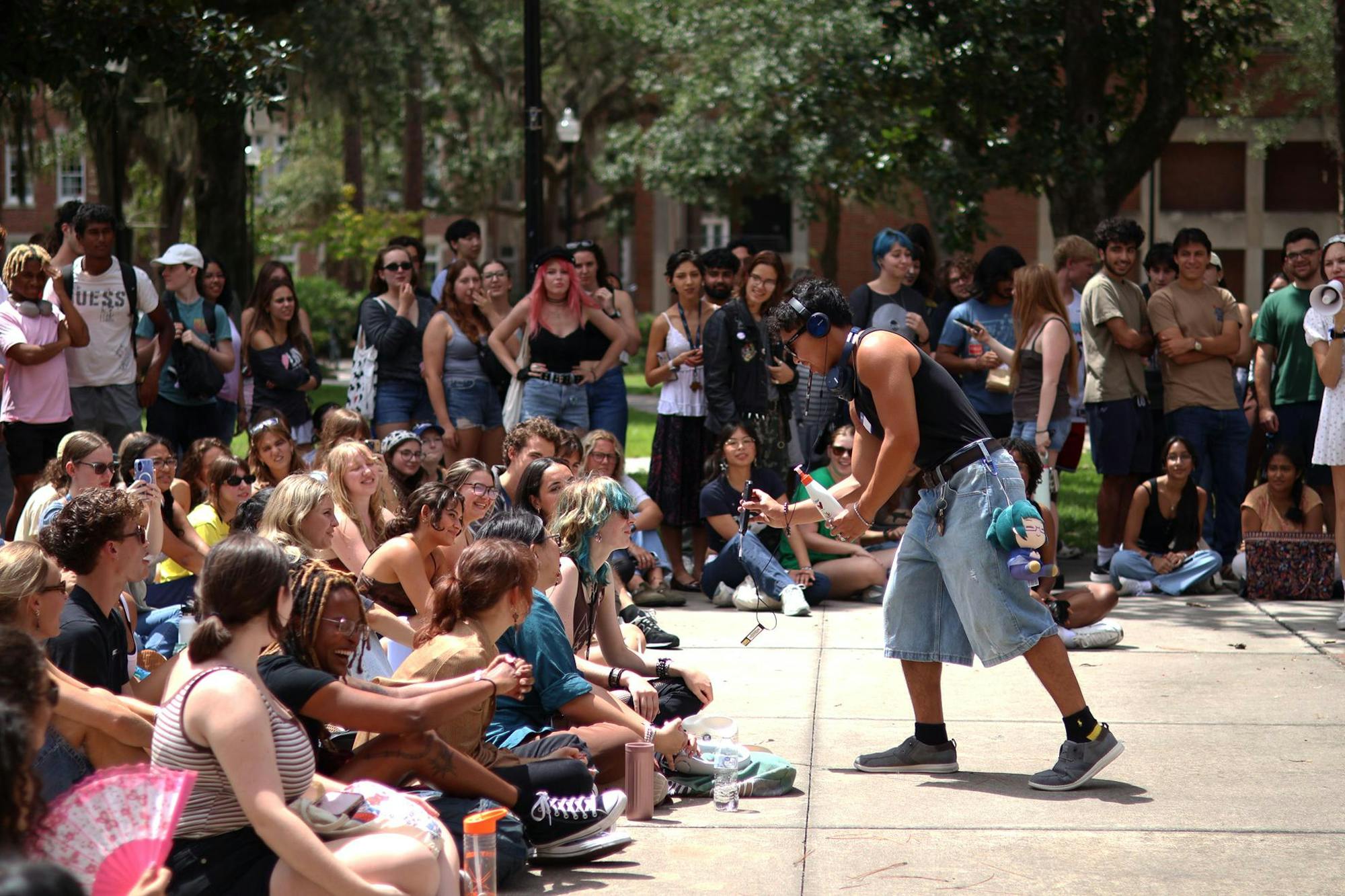Hold your Labubus tight — the performative males are approaching in oversized shirts and matcha in hand.
An informal “performative male contest” was held at UF’s Plaza of the Americas on Monday afternoon, drawing a crowd of about 60 audience members and almost 40 competitors.
A sea of men pretending to read feminist literature, wearing sagging jeans and unconnected wired headphones dangling from their ears, flooded the plaza for a chance to win the title of most performative male. One competitor even entered the contest with a partner dressed as a gold Labubu.
A performative male is a man who changes his physical appearance and behavior to appear more cultured and marketable to women, according to the Guardian. In the name of social validation, he’s passionate about indie artists, politically progressive topics and feminism. He is the antithesis of a toxic, nonchalant man.
The contest audience sat in front of Library West, where they made jokes and laughed at contestants’ outfits as the performative males strutted back and forth.
Olivia Phillips, an 18-year-old UF mathematics freshman, said a lot of men are catching up to the internet trend.
“Men are trying to be very feminist-forward,” Phillips said. “It's just a joke about men being feminist, I guess?”

Kirsten Green, an 18-year-old UF environmental science freshman, said the performative male stereotype is funny, and it’s “almost impressive” to see people go all-out for the contest.
But when it comes to actually coming across as a performative male, Green said, it’s different — it becomes cringeworthy now that it’s obviously inauthentic.
Shelby Buras, an 18-year-old UF nursing freshman, said she liked men with the performative male aesthetic until it became an internet sensation.
“I think in the beginning it worked, and then it’s become such a joke that it's just … they have to be really nonchalant about it for it to work,” she said.
Gavin Hart, a contestant who made it to the top 10 of the competition, joined because his friends — who have hosted numerous look-alike contests on campus — were hosting it. The neuroscience graduate student said he has been receiving accusations of being a performative male because of his love of matcha and lo-fi singer Clairo’s music.
“The truth is, I’ve just always been this way, and now that it’s a thing, people are pointing fingers at me,” he said.
The competition started with almost 40 contestants standing in a line, walking out one-by-one to the front, showcasing their performative male aesthetic. If the audience approved and wanted them to move on to the next round, they would yell, “yay.” If the competitors didn’t make the cut, the audience yelled “nay.”
Each of the competitors introduced themselves and told the audience what makes them performative. Some of them are Starbucks baristas. Others are psychology majors. Many of them listen to Laufey and The Smiths. In between cheers of approval and boos of dissatisfaction, competitors were cut until about 10 were left. The performative male who got the loudest cheers would be the winner.

Elliot Stevenson was declared the winner shortly after 3:30 p.m. The 18-year-old UF mechanical engineering freshman went above and beyond for the competition by wearing jorts, glasses, a tote bag and even bringing his cat, Percy. He won a $20 Barnes and Noble gift card “to buy feminist literature.”
“My friends always joke that I'm a performative male, so I thought it’d be funny to dress up,” Stevenson said.
He said he genuinely enjoys many things indicative of the performative male stereotype, such as listening to artists like Clairo and Beabadoobee, dressing “performatively” and reading feminist literature.
However, Stevenson said, the performative male stereotype can be harmful. Men performing in order to attract women is ingenuine and can perpetuate a cycle of toxic masculinity, he said, a way that men are socially pressured to behave.
“I don't think people should perform to enjoy those certain types of things,” Stevenson said. “I think they should really just do what they enjoy. Don’t conform to anybody’s standards.”
Contact Angelique Rodriguez at arodriguez@alligator.org. Follow her on X @angeliquesrod.

Angelique is a first-year journalism major and the Fall 2025 graduate school reporter. In her free time, she'll probably be reading, writing, hanging out with her friends or looking through the newest fashion runway shows on Vogue.






